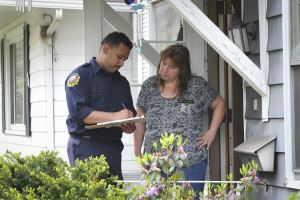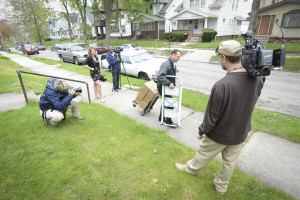 Today, the Toledo Fire & Rescue Department Fire Prevention Bureau was in the Willard Street neighborhood going door to door to discuss fire safety and distribute smoke alarms as needed. Currently, city of Toledo residents must go to their local Toledo fire station to receive smoke alarms that they may need.
Today, the Toledo Fire & Rescue Department Fire Prevention Bureau was in the Willard Street neighborhood going door to door to discuss fire safety and distribute smoke alarms as needed. Currently, city of Toledo residents must go to their local Toledo fire station to receive smoke alarms that they may need.
This is a new and proactive initiative of canvassing a neighborhood that has experienced the tragedy of a fatal fire. This program has been discussed in the past and it was decided that the department would launch this program in light of the recent fatal fire on Willard Street. The intent is to continue this program of canvassing neighborhoods in the event of any fatal fires in the future.
Residents of the city of Toledo may go to any fire station and receive smoke alarms as needed for their homes. One step included in this process is the completion of a “Smoke Alarm Distribution” form, available from our web site, or at their local Toledo fire station. Please understand the intent was not to supply the owners of apartment buildings or a multi-resident complex with a source for smoke alarms, but for the residents that may have a need with the compliance with city code.
 1301.11. Smoke detector requirements for dwelling units.
1301.11. Smoke detector requirements for dwelling units.
(a) After the effective date of this section, it shall be the responsibility of the owner of each existing structure which contains a residential dwelling to install smoke detectors as hereinafter provided. At least one smoke detector shall be installed to protect each sleeping area, and there shall be at least one smoke detector installed on each level of the dwelling (that is, cellar, basement, first floor, second floor).
(b) Such smoke detectors shall be capable of sensing visible or invisible particles of combustion and provide a suitable audible alarm thereof, and shall be certified as to having met Underwriters’ Laboratories Standards No. 217 for single and multiple stations smoke detectors. All smoke detectors shall be installed in accordance with the manufacturer’s directions as to location and installation where they do not conflict with the provisions of this section. A sleeping area is defined as the area or areas of the family unit in which the bedrooms or sleeping rooms are located. Where bedrooms or rooms ordinarily used for sleeping are separated by other use areas, such as kitchens or living rooms, but not bathrooms or closets, they shall be considered as separate sleeping areas for the purpose of this section and shall require protection. When actuated, the smoke detector shall provide a suitable alarm audible within the individual sleeping rooms or areas.
(c) After the effective date of this section, at every change of dwelling occupants of every dwelling unit occasioned by or incidental to a sale, rental, lease or sublease of such unit, it shall be the duty of the grantor thereof (that is, the seller, landlord, lessor or sublessor, as the case may be) to certify, before continued occupancy, to the grantee (new occupant) that all smoke detectors as required by this section, or other applicable laws, are installed and in proper working condition. Failure to comply with this subsection shall be punishable as set forth herein, provided however, that this subsection shall not be construed to vitiate or render void any contract, lease or sublease subject thereto.
(d) In all dwelling units the occupant shall be responsible for replacing the battery in battery-operated smoke detector units. In multi-family dwelling units, the property owners shall be responsible for all maintenance other than battery replacement.
(e) A tenant may not remove or render a smoke detector inoperative.
(f) As an alternative to self-contained smoke detectors, an approved fire detection system may be installed. Each fire detection system must be individually approved and a permit issued therefore by the Department of Fire and Rescue Operations.
(g) No smoke detector or alternative system shall be directly connected (permanently wired) to the electrical system of the structure unless an electrical permit has first been obtained from the Department of Inspection.
(h) Prohibitions. Whoever violates any of the provisions of Section 1301.11 shall be penalized as follows:
(1) A minor misdemeanor for the first offense.
(2) A misdemeanor of the third degree for a subsequent offense within four years.
(3) A misdemeanor of the first degree if the court finds that serious physical harm (as defined in Section 501.01(e) of the Toledo Municipal Code) or loss of life occurred during the course of a fire in a dwelling unit which failed to meet the requirements of this section.
(Ord. 350-03. 4-29-03.)
(i) This section is intended to be used with and supplemented by the applicable provisions of the National Fire Protection Association Standard 74, current edition, which are hereby incorporated herein; however, if there is any conflict between the statute and the supplemental standard, this statute and any rules and regulations adopted pursuant thereto shall prevail.
(Ord. 44-95. Passed 1-31-95; Ord. 26-11. Passed 2-8-11.)
